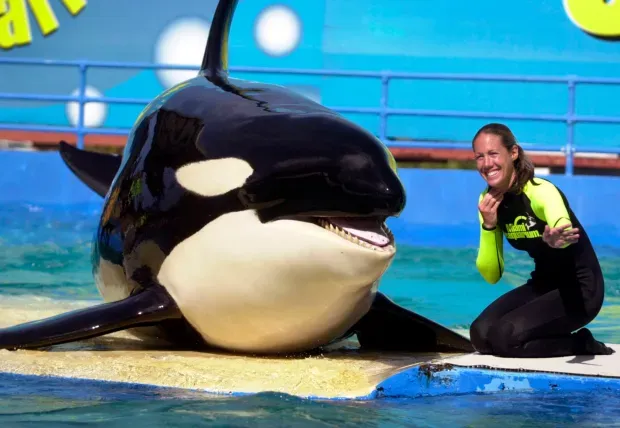The Fascinating World of Lolita Whales: Enigmatic Giants of the Sea
The oceans are home to a plethora of incredible marine creatures, each with its unique charm and mystique. Among these magnificent beings, the Lolita whale stands out as an enigmatic giant that has captured the imagination of both marine enthusiasts and the general public alike.

Introduction
The oceans are home to a plethora of incredible marine creatures, each with its unique charm and mystique. Among these magnificent beings, the Lolita whale stands out as an enigmatic giant that has captured the imagination of both marine enthusiasts and the general public alike. In this blog, we'll delve into the captivating world of the Lolita whale, exploring its characteristics, history, and the ongoing conversation about its welfare.
A Captivating Introduction
Lolita, a renowned orca whale, gained fame as a prominent attraction at the Miami Seaquarium for more than five decades. Originally known as Tokitae or "Toki," she adopted the name Lolita during her extended captivity period. Captured in 1970 from a Puget Sound pod near Seattle, she was subsequently acquired by the Miami Seaquarium. Throughout the years, advocacy groups tirelessly campaigned for her release, contending that she should be reunited with her native Pacific Northwest habitat. Tragically, on August 18, 2023, just as plans were unfolding to secure her liberty from captivity, Lolita passed away, leaving behind a legacy that touched the hearts of all who encountered her narrative. Her indomitable spirit continues to serve as an enduring inspiration, forever etched in memory.

Characteristics and Behavior
Lolita, the renowned orca whale, held a prominent role as a captivating attraction at the Miami Seaquarium for over five decades. Orcas, commonly referred to as killer whales, are the largest members of the dolphin family and stand as formidable predators in the global marine ecosystem. Instantly recognizable due to their striking black-and-white markings, these intelligent and social creatures are known for their intricate communication methods, utilizing distinct vocalizations that carry messages across their pods. Employing echolocation for communication and hunting, orcas emit sounds that travel through water, bouncing back upon encountering objects, divulging valuable information about their surroundings, size, and structure.
Adept hunters, orcas display remarkable coordination during group attacks. Their dietary preferences span a wide spectrum, encompassing fish, marine mammals like seals and sea lions, as well as larger prey such as other whales. Armed with formidable teeth, some reaching up to four inches in length, orcas exhibit diverse hunting techniques, including snatching seals from ice platforms. Operating in familial pods that can consist of up to 40 individuals, orcas exhibit distinct preferences among different populations – resident pods leaning towards fish-based diets, while transient pods target marine mammals.
Orcas' maternal instincts shine as they diligently care for their offspring. After a 17-month gestation period, mothers give birth to single calves, nurturing them through a nursing period of up to two years. While juveniles often venture away from their mothers as they mature, certain pods maintain lifelong connections. In contrast to their natural environment, captive settings fail to provide orcas with optimal living conditions. With their remarkable intelligence and social nature, orcas have historically been a fixture in marine park performances. However, the consensus has grown that captivity undermines their well-being. Lolita's story stands as a poignant illustration, spending her life in captivity at the Miami Seaquarium, highlighting the complexities and ethical considerations surrounding orcas' presence in such settings.
The Tale of Lolita
Lolita, an iconic orca whale, achieved fame as a star attraction at the Miami Seaquarium for an impressive span of over five decades. Originally dubbed "Tokitae" or affectionately referred to as "Toki," her name transformed to "Lolita" during her prolonged captivity period, emblematic of her captivating journey. In 1970, Lolita's capture unfolded in the Puget Sound near Seattle, amidst a pod of fellow whales. Subsequently, she was acquired by the Miami Seaquarium, where she captured the attention and hearts of many. Yet, her captivity stirred passionate advocacy, as animal rights groups relentlessly campaigned for her release, asserting her right to return to the Pacific Northwest, her original home. Tragically, the promising prospect of freedom was cut short as Lolita passed away on August 18, 2023, a poignant moment that arrived as plans for her release were gaining momentum. Her poignant narrative continues to inspire all who encounter it, forever commemorating her resilient spirit.
Lolita's life narrative is marked by remarkable resilience. In 1970, she was swept up in a tumultuous capture, which claimed the lives of four juvenile whales and an adult from her pod in the Puget Sound near Seattle. The challenges persisted in her captivity years, as in 1980, her mate Hugo succumbed to a tragic brain aneurysm, arising from repeated head impacts against his tank within the aquarium. Pritam Singh, the leader of Friends of Toki (Lolita), an animal rights group pivotal in the movement to liberate the orca, aptly noted, "She’s persevered through the difficulties that we human beings have enforced on her".
Lolita's captivating saga has resonated deeply with animal rights organizations that vehemently oppose the captivity of orcas and marine mammals. Ingrid Newkirk, the President of People for the Ethical Treatment of Animals (PETA), articulated the collective sentiment, lamenting the delayed plans for relocating Lolita to a seaside sanctuary—a realm where she could relish the ocean's depths and currents, even reuniting with the orca believed to be her mother. Tragically, the prospect of freedom remained elusive, leaving Lolita bereft of even a fleeting taste of liberty from her enduring 53-year captivity.
Ethical Considerations and Conservation
In the realm of wildlife protection and habitat preservation, a plethora of ethical considerations and dedicated conservation endeavors are underway. Conservation, the vanguard of safeguarding natural resources and wildlife for forthcoming generations, encompasses a spectrum of crucial aspects. Ethical contemplations within the ambit of conservation extend to the compassionate treatment of animals, the perpetuation of ecosystems, and the intricate interplay between human activities and the environment.

Among the cardinal ethical concerns within conservation, the humane treatment of animals emerges as a paramount focal point. This encompasses fostering a climate of respect and compassion for animals, irrespective of their habitat – be it the wild or captivity. Organizations are fervently championing the cause of safeguarding endangered species and curtailing instances of animal cruelty and exploitation, resonating with the ethical essence of conservation.
In tandem with this, the preservation of ecosystems assumes pivotal significance in ethical conservation. The task involves fortifying natural habitats and nurturing their health and diversity. The blueprint to achieve this involves multifaceted tactics, ranging from establishing sanctuaries to revitalizing beleaguered ecosystems, while concurrently fostering sustainable land management practices that reverence the harmony of nature.
FAQs
When was Lolita captured?
Lolita was captured in 1970 from a pod in the Puget Sound near Seattle. She was later sold to the Miami Seaquarium, where she remained in captivity for the majority of her life.
When did Lolita pass away?
Lolita passed away on Friday, August 18, 2023, ending her prolonged stay at the Miami Seaquarium. Her passing came as efforts were being made to secure her release from captivity and provide her with a more natural and spacious environment.
Did Lolita have any distinctive behaviors or characteristics?
One distinctive behavior associated with Lolita was her ability to mimic musical sounds and rhythms. Observers noted that she would often respond to musical instruments and live music performances by producing clicks, whistles, and calls, adding a unique and captivating dimension to her personality.
Conclusion
The Lolita whale, with its captivating appearance, intricate social structure, and remarkable intelligence, stands as a testament to the wonders of the ocean. While the debate about the ethics of keeping these animals in captivity continues, there's no denying the importance of understanding and appreciating their natural behaviors and habitats. As we strive to strike a balance between education and conservation, let's remember that the world of the Lolita whale is a window into the intricate web of life beneath the waves, urging us to protect and preserve it for generations to come.




